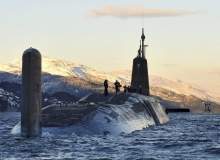
Trident” height=”305″ src=”https://www.naval-technology.com/wp-content/uploads/image-digitalinsightresearch/Archive/nri/naval/Trident.jpg” width=”431″ />
Set up by the nuclear disarmament think-tank British American Security Information Council (BASIC), the commission’s final report says the crucial consideration for the government’s decision to renew Trident should be national security. In particular, the report states that "close attention" must be paid to the relevance of emerging threats and the national capacity to meet them.
"If there is more than a negligible chance that the possession of nuclear weapons might play a decisive future role in the defence of the United Kingdom and its allies, in preventing nuclear blackmail or in affecting the wider security context within which the UK sits, then they should be retained," the report concludes.
The commissions says that the chances of the UK falling victim to strategic blackmail or a nuclear attack appears slim today, but there is sufficient uncertainty surrounding the prospect "that it would be imprudent to abandon such systems". The future, the report explains, should be approached with caution as we could witness a return to overt power politics with new rivalries emerging.
Contrary to many Trident renewal arguments, the commission says the UK’s status in the world is not a compelling reason to retain its nuclear arsenal. British representatives should "downplay any linkage" between status and possession of nuclear weapons, principally because it would weaken international resolve to pursue nuclear disarmament.
The panel identifies only one instance where status as a nuclear power may be advantageous, and that is maintaining a role in nuclear disarmament negotiations.
How well do you really know your competitors?
Access the most comprehensive Company Profiles on the market, powered by GlobalData. Save hours of research. Gain competitive edge.

Thank you!
Your download email will arrive shortly
Not ready to buy yet? Download a free sample
We are confident about the unique quality of our Company Profiles. However, we want you to make the most beneficial decision for your business, so we offer a free sample that you can download by submitting the below form
By GlobalDataMuch of the nuclear weapons debate today is framed around expenditure rather than strategic planning.
"In terms of international diplomatic or strategic influence, the UK’s continued possession of nuclear weapons would only be relevant to the specific objective of maintaining a seat at the nuclear disarmament negotiating table amongst nuclear weapon states," the report explains.
Adding to the continuous at sea deterrence debate
The final report also wades into the continuous at sea deterrence (CASD) debate, which continues to divide opinion in UK defence circles. Currently, the Royal Navy has at least one – out of a total of four – Trident submarine at sea at all times ready to deploy nuclear weapons if the order is given. Recent analysis by think-tanks like the Royal United Services Institute (RUSI) says the UK could operate three submarines without sacrificing nuclear deterrence.
Members of the panel, which includes former defence secretaries Des Browne and Malcolm Rifkind, say they are divided on CASD. The final report says some of the panel believes CASD should be maintained especially as other nations modernise their nuclear arsenals, while others say the current strategic environment allows a relaxation of CASD.
"There is in any case an opportunity to initiate a full conversation with the United States and France on the conditions that could allow the allied nuclear weapon states to consider closer coordination of their continuous patrolling posture," the report adds.
The Trident Commission’s conclusions will be unpopular with those opposed to nuclear weapons. It is equally unlikely to silence their discontent as the Main Gate decision for the renewal, planned for 2016, looms ever closer. Still, the commission’s final report is not a resounding show of support for nuclear weapons and options such as reducing the UK’s overall arsenal remain on the table.
Follow Grant Turnbull on Google+

.gif)

